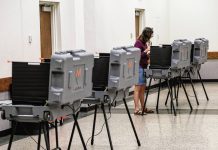Bartholomew Consolidated School Corp. board members voted 5-1 to uphold a committee’s decision to keep a challenged book in the Columbus East High School library.
District 1 board member Jason Major challenged the book in question and recused himself from the vote on Monday night. Logan Schulz, representing District 6, was the only board member to vote against the committee’s decision to keep the book “People Kill People” by author Ellen Hopkins, in the East library.
The board was required to determine whether “People Kill People” was “obscene” or “harmful to minors as defined by Indiana law.
The law defines that as:
(1) the average person, applying contemporary community standards, finds that the dominant theme of the matter or performance, taken as a whole, appeals to the prurient interest in sex;
(2) the matter or performance depicts or describes, in a patently offensive way, sexual conduct; and
(3) the matter or performance, taken as a whole, lacks serious literary, artistic, political, or scientific value.
On the other hand, material is harmful to minors if:
(1) it describes or represents, in any form, nudity, sexual conduct, sexual excitement, or sado-masochistic abuse;
(2) considered as a whole, it appeals to the prurient interest in sex of minors;
(3) it is patently offensive to prevailing standards in the adult community as a whole with respect to what is suitable matter for or performance before minors; and
(4) considered as a whole, it lacks serious literary, artistic, political, or scientific value for minors.
In the school board’s “written determination” of its decision, the board said the book is the story of several teenagers living in Tucson, Arizona, their pasts, and the circumstances that may motivate them to contemplate violence. The statement noted that the request to remove the book identified several parts of the book, describing them as “explicit and problematic.”
An author’s note in the book states gun violence in the U.S. needed to be addressed and the author “felt it was important to try and understand why someone might be compelled to pull the trigger.” The author also wrote, “The characters you’ll meet in these pages have powerful life situations driving them in negative directions.”
The board in its decision said the dominant theme of the book is an exploration of violence, specifically gun violence, and its causes, and, taken as a whole, does not appeal to a prurient interest in sex of adults or minors.
Schulz disputed the characterization of his vote, saying that he believed he was not voting to remove the book, but rather was denying to uphold the committee’s decision because he believed the book should require parental consent for children to view it. He told The Republic in a text message: “The vote was modified in a prior meeting to restrict the book to requiring parental consent. I do not and will not vote to remove a book.”
Schulz added that the vote was whether or not to “uphold” the findings proposed (as a whole), not a specific action within those findings. “Given my requirements of seeing adult levels of material needing parental consent, I was unable to vote yes to uphold the findings proposed even though I agree with the book remaining in the library,” he wrote.
BCSC Superintendent Jim Roberts told The Republic that the vote Schulz made had nothing to do with requiring parental consent and the nature of the motion was not modified at any time. A copy of the book determination provided by BCSC officials confirms that the vote was on whether to remove the book from the library or uphold the decision to keep it in the collection.
In an additional statement, Schulz wrote, “Hopkins courageously addresses urgent issues like gun violence, mental health, and trauma. However, parental consent is crucial for exposing children to such adult levels of material. “People Kill People” contains racially insensitive language, profanities, and disturbing depictions of sexual assault/violence, including child rape. As a parent, I recognize the damage of adult content being introduced too soon on children regardless of the means of delivery. While advocating for diverse literature, ensuring parental awareness is essential. As public servants, it’s our duty to prioritize the needs of parents, who are at the forefront of raising their children. Hence, I advocate requiring parental consent for explicit content accessible by their children.”
District 1 board member Jason Major filed the request for review of the book in January 2023 and a committee decided in March 2023 that the book should stay. Major said in a school board meeting Jan. 23 that he would be open to pulling his request for review if the board enacted a policy that would create a special section of the library that parents would have to opt into for their children to view materials.
That proposed policy had been introduced previously and was voted down.
Major said in a phone interview on Tuesday there was no further discussion with other board members regarding his suggestion and it was his impression the vote was indeed to determine whether to uphold the committee’s decision and did not have anything to do with parental consent, although he advocated his position again that there should be a separate section requiring that consent.
“My expectations on last night were that they were going to vote on whether the book stays or goes,” Major said.
BCSC policy 9130 outlines a process for a parent or guardian of a student, or community member living within the corporation to submit a request to remove material they believe to be obscene or harmful to minors, as defined by Indiana Code.
The policy allows the requester to appeal the committee’s decision, which is what happened in this complaint.
The complaint centers around pages 138 and 139 of the book. In a copy of the request for review Major wrote in the section asking why the book is objectionable: “In these pages there was a description of an act of rape of a child (Male to Boy Pedophilia).”
Major continued: “Additionally, the cover depicts a gun and the inside of the cover states: ‘Six teens. Six reasons to pull the trigger. Someone will fire. And someone will die. Guns just make it easier.’ Between the pedophilia and suggestive nature of gun violence, this is the reason for request of removal of this book.”
During public comment, Major said he expected that the board would vote that the book remain and said before reading from the two pages: “I know it has been stated that I’m trying to attack different cultures, lifestyles and police with my attempt to push for a restricted section. My concern is that we’re presenting material to students that includes age inappropriate elements.”
Major also “challenged” The Republic to publish these two pages. However, that is a violation of copyright law.
Public comments during meetings are restricted to 3 minutes and four seconds after the buzzer went off during Major’s turn to speak, board President Nikki Wheeldon said he had gone over his time.
Major attempted to continue to read from the passage, “I’ve got just a slight bit more and we’ve allowed people to go over in the past.”
Wheeldon responded that Major would be able to pause and continue to read at the end of the meeting during board comments.
Major again said he would continue to read before being stopped once again by Wheeldon.
On Tuesday Major said he felt as though he was not given proper due process, was not given an approriate amount to explain his position and there was a “double standard” at play.
“We’ve given so many people more than 3 minutes in public sessions in the past six months that I felt like it was a huge slap in the face to me last night to not have gotten that opportunity,” he said.
Community-member Meagan Johnson later went up to finish reading the remainder of the two pages.
“I understand the judging of a book as a whole, but at some point we (don’t) need to wait until the storm is over to know it’s raining,” Johnson said.
Community-member Barb Wills spoke about the requirements it takes to become a school librarian and said while the two pages can be difficult to read, the book taken in context as a whole could be helpful for those who have experienced similar tragedy.
“I absolutely agree that every guardian has the right to choose what their child can or cannot watch, read, and view,” Wills said. “But I have a question for you— have you read the entire book? Because I did, and yes, those pages are heart wrenching, but there are 9-year-old children in our community who have dealt with that and they don’t want to be felt like they’re left alone. If this book helps one person feel like they’re not alone, isn’t it worthwhile?”
Board member Todd Grimes said he had a conversation with a student recently that referenced the same book explicitly: “She made some comments that this author had helped her immensely and I know that you know— I have read the book and I’ll be the first to admit it’s rough,” Grimes said. ” … somebody made the comment that if it saves one kid, it’s worth it and I’ll stop my comments there.”
Major checked “no” on the section asking if he had “read, viewed, or listened to the complete work” in his request for review and said on Tuesday he still had not read the book, and felt as though the two pages are enough to make a determination on it.
“The reality of it is, I don’t need to wait out the storm to know that it was raining, right? What if I don’t read the whole book, what does it matter? I would say this, how many people have spoken in support of that book, and have completely overlooked the fact that we had a child rape section of that book, and we’re putting it in the presence of children,” Major said. “So at what point does child pornography not become child pornography and become literature?”
Major pulled from the site Book Looks the number of instances of profanity in the book and asked if The Republic would publish the different profanity and slurs in the book, along with their frequency.
“My thing is, is you probably would not be allowed to because it’s just not decent. It’s not something you want to do for the general public…” Major said.
Adding that BCSC board members do not use profanity during their meetings, he then used an implied profanity saying he could have looked at anyone in the line to comment and ask why the “profanity” aren’t you letting me “profanity” talk?”
“I mean, that’s just not how we do things,” he continued.
Major said his intent was for the book review to serve as a catalyst “that drives discussion to fix the system” and will inspire more parents to become “more aware of what’s happening in the education process for their child.”
He referred to BCSC’s performance reports which detail that reading proficiency for some BCSC student groups is below the state average.
“The reality of it is we’ve spent so much time talking about books that kids aren’t reading,” he said.





